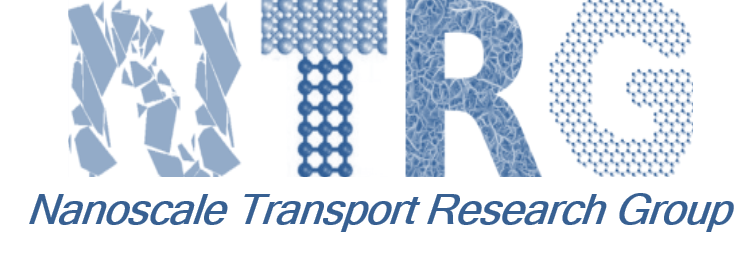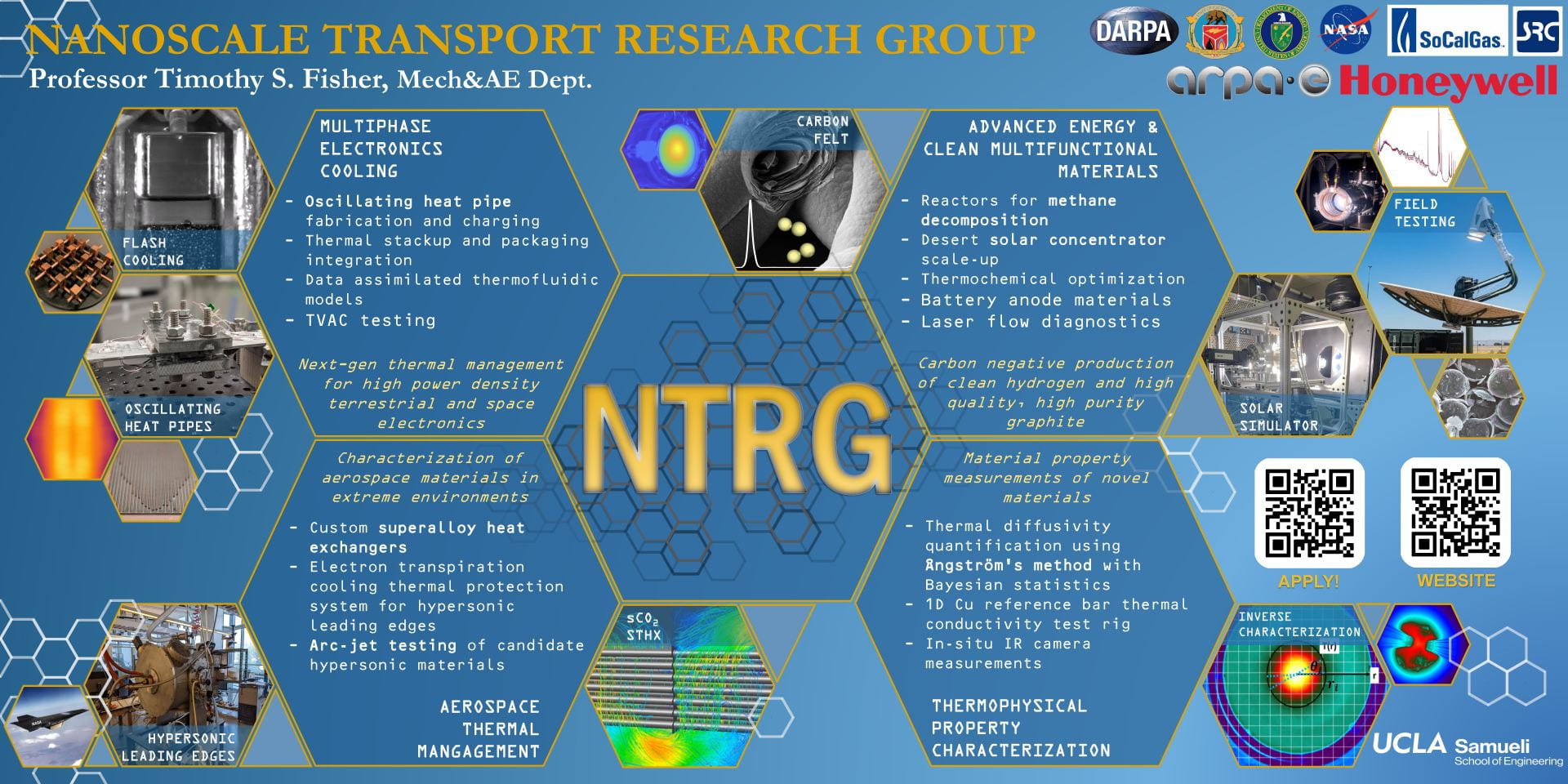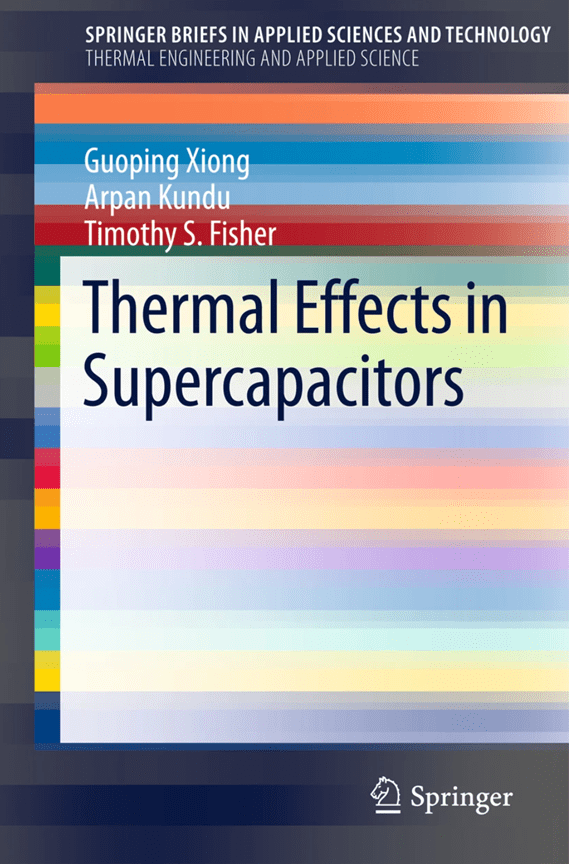Nano Transport Research Group (NTRG)
Welcome to our group’s home page. We work on a broad range of problems, primarily involving transport processes by electrons, phonons, photons, and fluids. We seek to solve problems with high importance to applications in energy transport, conversion, and storage that are relevant to major industrial segments (aerospace, micro/nanoelectronics, sensors, advanced materials and manufacturing). Some topics and methods of our research are summarized in the adjacent graphic.
– Tim Fisher†‡
Professor of Mechanical & Aerospace Engineering
John P. and Claudia H. Schauerman Endowed Chair in Engineering
Campus Faculty Director, UC LEADS
Henry Samueli School of Engineering & Applied Science
University of California Los Angeles
(ORCID, Google Scholar)
Contact
Office: 46-147H Engr IV UCLA
Office Hours: by appointment or see course syllabus
Mailing Address:
UCLA MAE Dept.
420 Westwood Plaza
46-147H Eng IV
Los Angeles, CA 90095-1597
Google Maps Link
Books
Centers and Groups
Online Courses, Lectures, and Tools
-
Thermal Energy at the Nanoscale, a nanoHUB-U short course. Many other nanoHUB-U courses are online; for more information visit the nanoHUB-U page.
-
ME 503: Micro-and Nano-scale Energy Transfer Processes
-
ME 595M: Computational Methods for Nanoscale Thermal Transport (experimental course, with J. Murthy)
-
Now on nanoHUB.org
-
Jamming of Soft Frictionless Spheres, a tool to predict granular microstructure.
-
Thermoelectric generator module with convective heat transfer
-
1D atomic chain phonon simulator using atomistic Green’s functions
-
Presentation/podcast on understanding phonons using 1D atomic chains
-
Presentation/podcast on electron emission from carbon nanomaterials
-
Lectures on nanoHUB
Tools on nanoHUB
Research Areas
Advanced Energy & Clean Multifunctional Materials
Carbon negative production of clean hydrogen and high-quality, high purity graphite
Aerospace Thermal Management
Characterization of aerospace materials and technologies in extreme environments
Multiphase Electronics Cooling
Next-gen thermal management for high power density terrestrial and space electronics
Information for Prospective Students
Our research group is characterized by a passion for discovering, explaining, and developing new knowledge through persistent effort intelligently applied. Students seeking a research position with us are encouraged to review the admission guidelines provided by UCLA’s Mechanical & Aerospace Engineering Graduate Program. Qualified students should then review the other pages of this website to identify specific research topics of mutual interest. These topics should be highlighted in any correspondence and in application materials. Interested students would also benefit from studying the materials contained in the online nanoHUB-U course, Thermal Energy at the Nanoscale, which can be taken in self-paced mode without a registration fee (i.e., free). Prospective students interested in more general information about life at UCLA and its surroundings might benefit from this series of posts.
▪▪▪▪▪
I receive far more email inquiries from prospective group members than I can manage. Consequently, I have created an online form that interested researchers of all types (undergrad, grad, postdoc) should complete below. The form is intentionally short and should require less than 15 minutes to complete.
†Conflict of Interest Statement
This website pertains to my academic work and related research group and campus community activities. Separately, I occasionally provide private consulting and am also co-founder of a company (SolGrapH Inc.) that is involved with solar-thermal material synthesis. These non-academic activities fall outside the scope of this website, which is neither intended nor represented as any type of commercial product or promotion.
— TSF
‡Mentor-Mentee Compact*
(*Adapted Compact from Laboratory of Dr. Trina McMahon for Graduate Students, University of Wisconsin-Madison)Broad goals of our research program
As part of my job as a professor, I am expected to write grants and initiate research that will make tangible contributions to science, the academic community, and to society. You will be helping me execute this research. It is imperative that we use rigorous scientific methods and conduct ourselves ethically at all times. We must always keep in mind that the ultimate goal of our research is publication in scientific journals. Dissemination of the knowledge we gain is critical to the advancement of our field. I also value outreach and informal science/technology education, both in the classroom and while engaging with the public. I expect you to participate in this component of our lab mission while you are part of the lab group.



